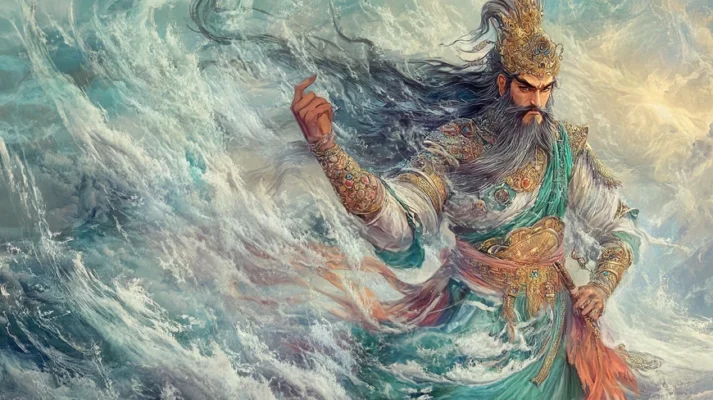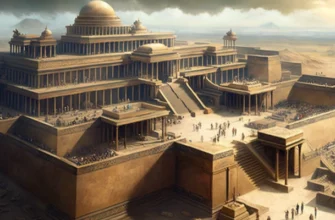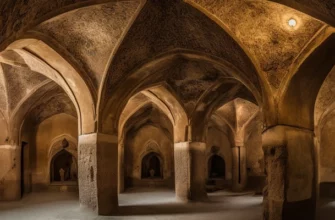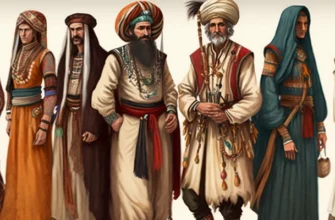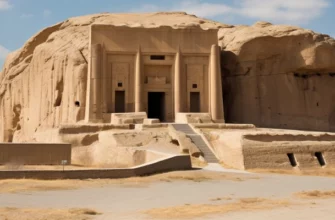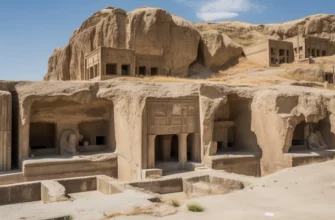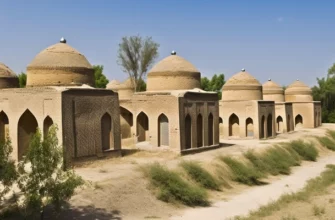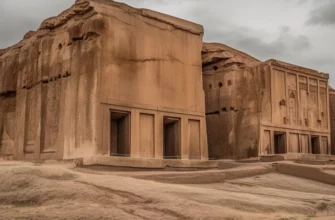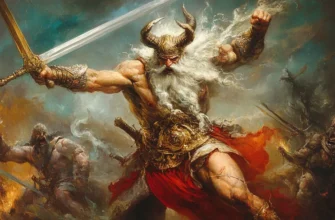Vayu, or Vahu, is one of the central gods of ancient Iranian mythology, associated with wind, perfection, and clarity. In Zoroastrianism, Vayu is considered an important messenger of divine will, bringing life and energy.
The name Vayu comes from an ancient Iranian word meaning “wind.” He symbolizes purity, righteous thoughts, and actions. Vayu is considered the creator of natural phenomena, and his winds reflect the power and dynamism of the universe. In Zoroastrianism, Vayu plays an important role in maintaining cosmic order, interacting with people and protecting them from evil. He is also associated with pure intentions and good deeds, helping the righteous in their endeavors.
In mythology, Vayu is a figure who constantly appears in legends about the creation of the world and the fight against evil. He was revered through rituals that emphasized the importance of wind as a source of life. Vayu remains a symbol of the power of nature and divine order in Iranian culture. Thus, Vayu occupies an important place in ancient Iranian beliefs as a god who protects and guides people to good deeds, and his legacy lives on in modern Iranian culture and mythology.
The significance of Vayu in Iranian mythology
Vayu has a significant place in Iranian mythology as he symbolizes the power of the wind and the connection between the deity and humans. As the god of wind, he embodies the dynamic nature of the universe and the importance of air for life. Vayu is the messenger of divine will, bringing blessings and helping in the fight against evil. His winds are associated with freedom, movement, and vital energy.
Vayu is also associated with purity of thought and action, which is why he is considered the patron of righteousness. In Zoroastrianism, he acts as a protector who guides the souls of the dead to their final destination. The importance of Vayu is emphasized in rituals and legends, where his figure embodies the ideals of morality and order, which are key in Zoroastrianism.
Thus, Vayu not only symbolizes natural phenomena, but also reflects moral values and spiritual principles that play an important role in Iranian culture.
The role of Vayu in Zoroastrianism
Vayu plays an important role in Zoroastrianism as the god of wind and messenger of divine will. He symbolizes perfection, purity, and righteousness, helping people in their good deeds. Vayu is associated with maintaining cosmic order, protecting humanity from evil.
His function includes guiding the souls of the dead to their final destination, emphasizing his role as a mediator between humans and the deity. Vayu also influences natural phenomena, his winds being a source of life and energy. In Zoroastrianism, rituals are dedicated to him, emphasizing the importance of wind as a symbol of divine grace.
Thus, Vayu is a key figure who reflects the basic principles of Zoroastrianism, such as the fight against evil, righteousness, and harmony in nature. His influence on human life and the natural world makes him an important deity in this religion.
Vayu’s divine function in Zoroastrianism lies in his role as the messenger of divine will and guardian of cosmic order. He acts as a mediator between humans and the god Ahura Mazda, providing a link between heaven and earth.
Vayu is associated with righteous thoughts, words, and deeds, making him a symbol of moral purity. His winds are not only a natural phenomenon but also a manifestation of divine power that brings life, energy, and prosperity. He helps people in their efforts to achieve good deeds by providing them with inspiration and support.
In addition, Vayu acts as the protector of the souls of the dead, guiding them to their final destination. This emphasizes his importance in the context of the afterlife and moral responsibility. Thus, Vayu’s divine function encompasses both natural and spiritual aspects, making him a key figure in Zoroastrianism.
Vayu as the creator of life
Vayu is considered the creator of life in Zoroastrianism because he is associated with the wind, which is a source of energy and vitality. As the god of wind, Vayu symbolizes movement and dynamism, which are necessary to maintain natural balance. His winds ensure the fertility of the earth, promoting plant growth and animal life.
Vayu also plays an important role in the processes that sustain life cycles, particularly through his interactions with other natural elements. He assists in the transport of seeds, water, and other natural resources, promoting growth and prosperity. Thus, Vayu is not only a symbol of life, but also an active participant in its maintenance and expansion.
In addition, his role as the creator of life emphasizes the importance of purity of thought and action, as Zoroastrianism teaches that only good intentions and deeds can lead to prosperity. Vayu, as a divine wind spirit, encourages people to adhere to moral principles in order to maintain balance in the world and ensure the well-being of all living beings.
Vayu in mythology
Vayu occupies an important place in Iranian mythology, where his image embodies the forces of nature and divine principles. He is often mentioned in legends about the creation of the world, where his winds symbolize movement and life. Vayu is associated with purity and righteousness, being considered a deity who helps people in their good deeds.
In myths, Vayu interacts with other deities, such as Ahura Mazda, and acts as a messenger of divine will. His winds are often described as bringing joy, health, and prosperity, or, conversely, as forces that can cause destruction if people violate moral laws.
Vayu is also an important character in stories about the afterlife, where he guides the souls of the dead to their destination. This role emphasizes his importance in the context of moral responsibility and maintaining order in the world.
In addition, the image of Vayu is present in rituals and worship, marking him as a protector and creator of life. His function in mythology emphasizes the importance of wind as an element that maintains balance and harmony in nature. Thus, Vayu appears in mythology as a complex and multifaceted figure, combining the forces of nature and spiritual principles.
Myths and legends
Vayu appears in many myths and legends that emphasize his role in the creation of the world, the maintenance of cosmic order, and interaction with other deities. One of the main myths tells how Vayu, as the god of wind, helps in the creation of living beings, giving them energy and life. His winds, which blow throughout the world, symbolize movement and development.
In Zoroastrian texts, Vayu is described as the one who leads the souls of the dead to their final destination. This role emphasizes his importance as a mediator between the world of the living and the world of the dead, as well as his responsibility for maintaining moral order.
Another popular legend associates Vayu with the fight against evil. In these stories, he sides with the righteous, helping them in their struggle against demons and darkness. His winds can be both a blessing and a punishment, depending on people’s behavior.
Thus, the myths and legends about Vayu not only illustrate his divine nature, but also convey important moral lessons about righteousness, responsibility, and man’s connection with nature. These stories emphasize his role as a protector and creator, as well as his importance in the cultural and spiritual life of the Iranian people.
Stories about Vayu
Stories about Vayu in Iranian mythology often focus on his role as the god of wind, creator of life, and messenger of divine will. Here are some key plots:
Creation of life: One legend describes how Vayu assists Ahura Mazda in the process of creating the world. He brings winds that activate the natural elements, giving life to plants and animals. Vayu’s winds symbolize the energy necessary for growth and development.
Guiding souls: Another story concerns Vayu’s role as the guide of the souls of the dead. After death, souls go through a complex process of judgment, where Vayu leads them to the Chinvat Bridge. He helps the righteous cross over to the other side, where their reward awaits, and leads the sinners to their punishment.
Fighting evil: In myths, Vayu often acts as a protector, fighting against demons and evil spirits. In these stories, his winds become a weapon that destroys darkness and cleanses the world of evil. He helps heroes in their adventures, giving them strength and inspiration.
Vayu Festival: There are also legends about festivals dedicated to Vayu, during which believers honor him as a god who brings blessings and life. These festivals are accompanied by rituals symbolizing gratitude for natural resources and support.
These stories not only illustrate Vayu’s divine nature, but also convey important moral lessons about responsibility, righteousness, and the interconnection between humans and nature.
Interaction with other gods
Vayu actively interacts with other deities in Iranian mythology, emphasizing his importance in the cosmic order. One of the most significant gods with whom he communicates is Ahura Mazda, the supreme god of Zoroastrianism. The interaction between them symbolizes cooperation in the creation and maintenance of the world. Vayu acts as a messenger who brings divine commands and assists in the implementation of Ahura Mazda’s plans.
Vayu is also often depicted in conflict with demons and evil spirits, such as Angra Mainyu (Ahriman). In these stories, he uses his winds as weapons against the forces of evil, helping heroes and righteous people in their struggles.
Other important figures with whom Vayu interacts are the gods responsible for other natural elements, such as Tishthya (god of stars and rain) and Varuna (god of water). In these myths, Vayu and other deities work together to maintain balance in nature, ensuring fertility, life, and harmony.
Thus, Vayu’s interaction with other gods emphasizes his role in maintaining cosmic order, fighting evil, and ensuring the well-being of people, as well as demonstrating the importance of cooperation between deities in Iranian mythology.
Cult and worship
The cult and worship of Vayu had an important place in Iranian culture, as he is considered a deity who brings life and maintains order in nature. His worship included various rituals and ceremonies that emphasized his importance.
One of the main aspects of the cult of Vayu was the celebration of natural cycles. Believers performed rituals associated with the changing seasons to thank Vayu for the winds that provided fertility and life. These celebrations were accompanied by songs, dances, and sacrifices in honor of the god.
Vayu was also revered in the context of blessings for health and well-being. People turned to him for help in times of trouble, asking for good winds that would bring prosperity and happiness. Rituals were often held outdoors, where believers could feel his presence through the touch of the wind.
Temples and shrines dedicated to Vayu were usually located in places with good natural energy, such as mountains or coastlines. Religious ceremonies were held in these shrines, emphasizing the importance of wind in people’s lives.
Thus, the cult of Vayu not only supported the spiritual practices of the Iranians, but also emphasized their connection with nature, emphasizing the importance of wind as a symbol of life and harmony.
Rituals and ceremonies
The rituals and ceremonies associated with the cult of Vayu were intended to honor him as the god of wind and the creator of life. Here are some key aspects of these rituals:
Wind festivals: Ceremonies were held to mark the changing seasons, especially in spring when nature awakens. These festivals included songs, dances, and sacrifices to symbolize gratitude to Vayu for his blessings.
Sacrifices: Believers often made sacrifices such as grain, fruit, and animals to appease Vayu and ask him for health, prosperity, and a good harvest. These sacrifices could take place in open spaces where the power of the wind could be felt.
Prayers and incantations: During rituals, prayers and incantations were recited, appealing to Vayu for protection, inspiration, and assistance in good deeds. These texts often contained references to natural forces.
Wind symbols: Symbols associated with the wind were used in rituals, such as fabrics fluttering in the wind or windmills, which served as reminders of Vayu’s power and influence.
Purification rites: Purification rites were often performed to symbolize the release of negativity and preparation for receiving divine grace. This included the use of water, burning fires, and aromatic resins.
These rituals and ceremonies not only served to honor Vayu, but also strengthened people’s connection to nature, emphasizing the importance of wind as an element that sustains life and harmony.
Importance in Iranian culture
Vayu is of significant importance in Iranian culture, as his image and role reflect the deep connections between humans and nature. As the god of wind and creator of life, Vayu symbolizes the vital energy necessary for prosperity. His influence is evident in many aspects of culture, religion, and daily life.
First, the worship of Vayu emphasizes the importance of natural elements in Iranian cosmology. Wind is associated with movement, change, and new beginnings, making it an important symbol in cultural conceptions of life and its cycles.
Second, Vayu is a central figure in religious rituals that promote moral values associated with righteousness, purity, and responsibility. These principles reinforce the social norms and traditions that shape the identity of the Iranian people.
In addition, the image of Vayu is reflected in literature, poetry, and art, where it symbolizes not only the physical but also the spiritual aspects of life. In cultural works, his winds are often described as a source of inspiration and strength.
Thus, Vayu is an important part of Iranian cultural heritage, representing a connection between nature, spirituality, and human values that has lasted for centuries.
Conclusion
The Iranian god Vayu, as the god of wind and creator of life, has a significant influence on contemporary Iranian culture and society. His image continues to embody the importance of nature, morality, and spirituality. In the modern context, Vayu symbolizes harmony between humans and the natural environment, which is particularly relevant in the face of contemporary environmental challenges.
The worship of Vayu and the rituals associated with it help to maintain the traditions that shape the identity of the Iranian people. This preserves cultural heritage and gives meaning to modern life, encouraging people to adhere to moral principles and respect nature.
In addition, Vayu’s influence can be traced in literature, art, and folklore, where his image continues to inspire creativity. His significance as a messenger of divine will and guardian of order remains relevant in today’s world, where moral values and environmental awareness are becoming increasingly important.
Thus, Vayu remains an important figure who influences the cultural and spiritual consciousness of modern Iranians, emphasizing the connection between the traditions of the past and the challenges of the present.
